It really is time that we ended this adversarial discussion between climate and farming. Farmers are very much are stewards of the land.
A ban on burning or extracting peat, auctioned contracts for tree planting, and an increase in crops grown for energy are just some of the ideas put forward by the government’s climate change advisors to bring about dramatic falls in greenhouse gas emissions (GHGs).
In its first in-depth report on advice on agricultural policies, the Climate Change Committee suggests that UK forestry cover should be boosted from 13 percent to at least 17 per cent by 2050 by planting up to 120 million trees a year, while at least 50 per cent of peatlands should be restored.
Agriculture is responsible for 12 percent of the UK’s GHGs. The CCC highlighted the current opportunity for change, as new agriculture and environment bills are being introduced this month to replace existing systems once the UK leaves the EU.
Stewards
The report also recommended reducing food waste by 20 per cent, as well as a 20 per cent cut per person in the consumption of beef, lamb and dairy.
Lord Deben, chairman of the Committee on Climate Change, said: "Changing the way we use our land is critical to delivering the UK's net zero target.
"The options we are proposing would see farmers and land managers - the stewards of the land - delivering actions to reduce emissions.
"Doing so can provide new revenue opportunities for farmers, better air quality and improved biodiversity, and more green spaces for us all to enjoy."
But he said the changes could not be delivered in the normal course of business, and warned: "We are in a race against time, there's no doubt urgency must be the hallmark of what we are doing here."
Peat
Chris Stark, chief executive of the Committee on Climate Change said: “It really is time that we ended this adversarial discussion between climate and farming.
"Farmers are very much are stewards of the land, and measures we propose today would see those stewards delivering a nearly two thirds reduction in greenhouse gas emissions.”
Tony Juniper, chairman of Natural England, said: "Given the scale of the challenge, a joined-up approach that embraces nature's recovery is not an optional extra, but must be central to the whole plan, to both catch carbon and to help us adapt to what are now inevitable climate change impacts.
"The good news is that restoring of peatlands, the re-establishing of forest cover, and the re-naturalising of the coast will deliver multiple additional benefits for the country, including for our wildlife and collective health and wellbeing."
It really is time that we ended this adversarial discussion between climate and farming. Farmers are very much are stewards of the land.
The National Trust, a major landowner across the UK, welcomed recommendations in the CCC report to develop more multi-purpose woodlands and support peatland restoration.
Patrick Begg, director of natural resources at the charity, said: "Trees and peat soils are our natural armour in the fight against climate change; they lock away carbon, clean the air and provide habitats for an array of wildlife. "Investing in them is a common-sense solution that the government should be delivering now."
“Blinkered approach”
However, recommendations by the committee to expand UK energy crops to around 23,000 hectares each year alarmed environmental groups.
Sustainable farming coordinator for the Sustain alliance, Vicki Hird said: “The emphasis on more monoculture energy crops to feed power plants is dangerous - a blinkered approach could damage biodiversity and ecosystems as well as our food security.”
Sandra Bell, campaigner at Friends of the Earth, said: “To avoid exporting food production, farmland should be held for producing food and not energy crops. Where there is a case for biomass it must be based on genuine waste and residues not dedicated crops.”
This Author
Catherine Early is a freelance environmental journalist and chief reporter for the Ecologist. She can be found tweeting at @Cat_Early76.







